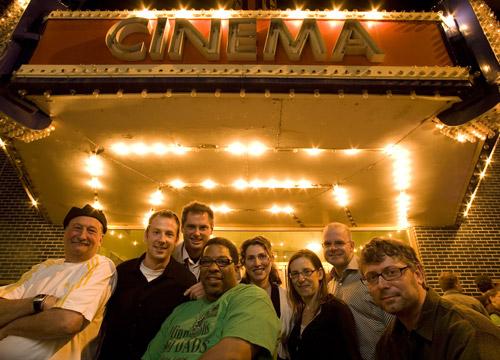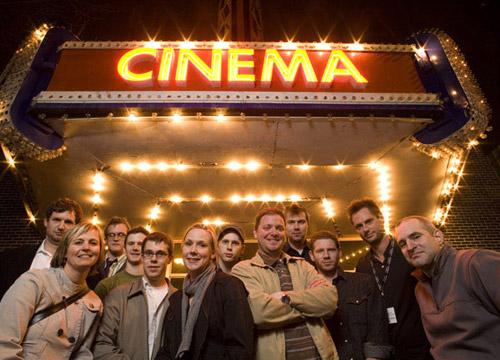MN Film: Responsibility Is Our Middle Name
Suzanne Szucs looked in on some Minnesota filmmakers at the International Film Festival. Here's what she saw.


Cinema is alive, well and thriving in Minnesota. I just took in the Minnesota Documentary and Minnesota Shorts events at the 25th Annual Minnesota International Film Festival, so I know.
The documentary evening was subdued, warming up to the audience over its 106 minutes of programming. “Change: Past, Present and Future” was the focus given to the evening by curator Bob Marsden (who put the evening together along with noted Minnesota filmmaker Melody Gilbert). Responsibility, though, rather than change, seemed to be the overriding theme.
The evening started with 5 short pieces made as part of the Minnesota Historical Society Greatest Generations project. Individual portraits of men and women who lived through the Great Depression and came of age during World War II, these films all expressed a common theme of personal responsibility, hard work, and commitment. Not made for large-screen viewing, the films could be hard to look at, and were sometimes low-grade video transfers that shot colors into unnatural gamuts.
Even given the weaknesses in presentation, interviewees were compelling: both humble and excited to tell their stories. Despite the technical hitches and inconsistently successful filmmaking styles, I found the portraits inspirational. The highlight of this group was 16-year-old Ali Drube’s portrait, “My Grandma Lucy.” Not only was the story touching, Drube’s research was impeccable.
The highlight of the evening was Kevin McKeever’s film about the life and work of V.J. Smith, founding member of the Minnesota chapter of MAD Dads (Men Against Destruction – Defending Against Drugs and Social Disorder). “Mad Love: V.J. Smith and MAD Dads” is beautifully filmed, combining traditional interviews and in-depth reporting with visually compelling imagery that with deft editing moves the narrative along. In the Q & A following the program, McKeever said that 15 hours of material was edited into the film’s half-hour.
MAD Dads is an organization dedicated to bringing positive change to gang-ravaged communities. What becomes clear in the film is that the community at large must be responsible for change. “If we all step up, we can make it happen,” says Smith. We recognize the “Greatest Generation,” historically, as a broad mobilization of individuals to affect the common good. Even as we are praising that generation, though, we seem to have forgotten its lesson. Smith and his brethren remind us we are all complicit in the success or failure of our society.
The last two films of the evening continued this idea, approaching the idea of responsibility first on an individual basis with Mark Wojahn’s portrait of local sculptor David Hamlow (who uses recycled material in his art). Mitch Water’s production “Stewards of the Earth” addresses social responsibility around the issue of global warming. The ideal venue for “Stewards” is local school systems; apparently Water has distributed thousands of copies already. Water’s documentary creates a rallying point for progressive and conservative thinkers alike, as it speaks to issues of morality – it questions our individual responsibility to care for the entire planet and our global responsibility to care for and provide for others.
Whereas the “Docs” evening focused on issues of social responsibility, the “MN Shorts” were about relationships. I spoke with Bobby Marsden, co-founder of Fearless Filmmakers, about his approach to curating for festivals. He expressed disappointment that so often short-films programming seems random, with no thought to the order or relationship between films. If you saw both evenings, it was clear that Marsden had carefully considered the flow of the programming, each film building on the one before it. Marsden speaks with passion about the need to have high-quality screening events. When good films are made here, he says, it “brings heat and attention back on the Twin Cities, it creates opportunities for filmmakers to do something.”
Riding around on my bike during the recent spate of good weather, the hum of the wheels keeps making me think about Collier White’s “Tiny Explosions,” a short action/drama/musical adventure featuring radical cyclists in a post-epidemic Minneapolis. Part of the Minnesota Shorts programming, this unusual film pushed boundaries. It was a little unfocused and disjointed, but it’s been the film that has stuck with me, following me around, making me smile and, yeah, think. When asked why he used a musical format, White explained he thought that was the most expedient way of “getting to inner thoughts.” His characters are questioning their semi-futuristic world – all those questions are topical and it is good to see them being asked in an unconventional form.
If the MN Docs evening was supported by Marsden’s acute curating, the MN Shorts evening was also supported by his deft hand. These films needed it less- they were pretty fabulous in their own right. Marsden chose the group around the theme of relationships and each film, from a 2-minute animation to White’s half-hour epic, pushed that idea in sometimes surprising ways. Highlights included William Prouty’s “Tag” – a 5-minute race through the streets of London between a bike courier and an inline skater that had audience members on the edges of their seats with inventive camera handling and breathless cuts.
William Kruse’s “H-E-N-R-Y” was a provocative portrait of two prison inmates wagering for a basketball – in so doing, they share their stories. It presents a thoughtful, beautifully filmed view of intimacy between men, the inhumanity of prison, and the tragedy of regret. On a less serious note, “Mile’s Crowe’s 1st Annual Egg Hunt Standoff” uses the mockumentary format to laugh at societal views of maleness, intimacy and competition.
I was thrilled with the films I saw. Although Marsden told me that contacting the filmmakers themselves is still the best way to get hold of these films, the internet has changed the independent scene; filmmakers are now able to self-distribute via sites such as Google Video and revver.com. Filmmakers are actually able to make money per view – a revolutionary idea. If I have one complaint, it is that Minnesota Film Arts could help out the artists by providing a little bit more contact information on their festival website – helping us all get that much further past Hollywood.